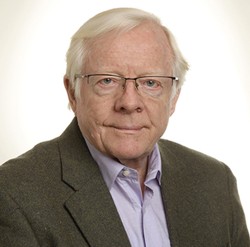
The past January 28, the sociologist Swedish Göran Therborn was invested Doctor Honoris Causa at the UNED during the celebration of the feast of Saint Thomas Aquinas.
The professor of Sociology of the UNED, Jose Felix Tezanos Tortajada, was the godfather of Göran Therborn, a sociologist and political scientist that stood out as an intellectual of the new left in Sweden in the 60’s. In their work, Therborn addresses the formation and transformation of the ideology on the subject, the constitution ideological of the social classes and the domination ideology, by developing a matrix material of ideologies, and a general outline of this construction from the perspective of post-marxist. In this line, has delved into the intersection between the class structure and functions of the State apparatus. In his inauguration speech made a profound analysis on the state of the Sociology of TWENTY-first century.
Therborn was born in Sweden in 1941, and there, at the University of Lund, he studied Political Science, Sociology and Economics, and received his phd in Sociology in 1974. In 1981, after several academic works in their country of origin, was appointed a Professor of Political Science at the Catholic University of Nijmegen, the Netherlands. He returned as a Professor of Sociology at the University of Gothenburg in 1987. Between 1989 and 1991 he was the representative of the Social Sciences in the Research Council of the Government, and from 1996 to 1999 he chaired in Sweden a group of interdisciplinary and inter-university global studies.
During the period between 1996 and 2006 he was the co-director of the Swedish College for Advanced Studies in the Social Sciences in Uppsala. He was visiting professor in different American countries -from Madison (Wisconsin) to Buenos Aires – Tehran and Seoul in Asia, the National University of Australia, and in Europe from Budapest to Paris-The Sorbonne and Pompeu Fabra university in Barcelona. In 2006 he was appointed Professor of Sociology at the University of Cambridge. After his retirement in 2010, he continues to teach at Cambridge, and is also affiliated to the University of Linnaeus in Sweden. Participates as a scientific advisor for several international and national research and is Academician of the Academy of the Social Sciences in the United Kingdom. Before the honor of the UNED has received three Honorary doctorates.
Their lines of work are located in five major thematic areas:
- Critical revision of the marxist theory applied to Social Sciences
- Social classes and inequalities
- Policies compared, especially is social and work aspects
- Emergence and trajectory of electoral democracy and the recognition of the right to vote in countries of the OECD, Latin America and other parts of the world
- Dynamic supranational, both in terms of the formation and the future prospects of Europe as well as in what relates to the current course of globalization
His intellectual work comprises thirty books and a large number of articles published in at least twenty-four languages. Its production comprises various topics (below are some examples of publications):
- Marxist theory related to the social sciences and empirical investigation of today: Class, Science and Society (doctoral dissertation, 1974/76), As it dominates the ruling class? (1978), The Ideology of Power and the Power of Ideology (1980)
- The history of marxism and in critical theory-modern Criticism and revolution (l972), From Marxism to Postmarxism? (2008)
- The appearance and the trajectory of electoral democracy and the right to vote, in the countries of the OECD (1977), in Latin America (1979), in the world (The Right to Vote and the Four Routes to/ through Modernity, (l992), long essays)
- The ability and the strength classes (Bourgeoisie and bureaucracy in Sweden -book in Swedish 1989-, various articles, for example Why Some Classes Are More Successful Than Others (l983); most recent: Class in the 21st Century, 2012)
- Public policies compared, notably social and labour (even the book why in some countries there are more unemployed than others? (l986/l989); the most recent article why in some countries there are more unemployed than others? – Part II 25 years later (2012)
- Education and the future of Europe (Europe for the twenty first century -1995/1999/2009-)
- Globalization (The World (2012))
- The family and relations of sex, gender, and generation (Between Sex and Power. Family in the World, 1900-2000 (2004))
- The dynamics of inequalities (The killing fields of inequality, 2013)
- Cities of power (project in progress, incl. the book Capital Cities in Africa, (2012); the most recent article: “Global Cities”, World Power, and the G20 Capital Cities, (2013))
-
-
-
- Overview Göran Therborn
- Laudatio Göran Therborn
- Speech By Göran Therborn
-
-
Feast of Saint Thomas Aquinas 2014. Dr. Honoris Causa, Göran Therborn
During the celebration of the feast of Saint Thomas Aquinas, in the UNED, was invested Doctor Honoris Causa by the sociologist Swedish Göran Therborn and is given the medal of the university Merit at the ex-rector Juan Antonio Gimeno Ullastres, were also endowed the new doctors of the UNED. Alejandro Tiana Ferrer, rector of the university, chaired the event, accompanied by Federico Morán Abad, general secretary of Universities.
Series: Act of celebration of the feast of st. Thomas
Source: portal.uned.it is
